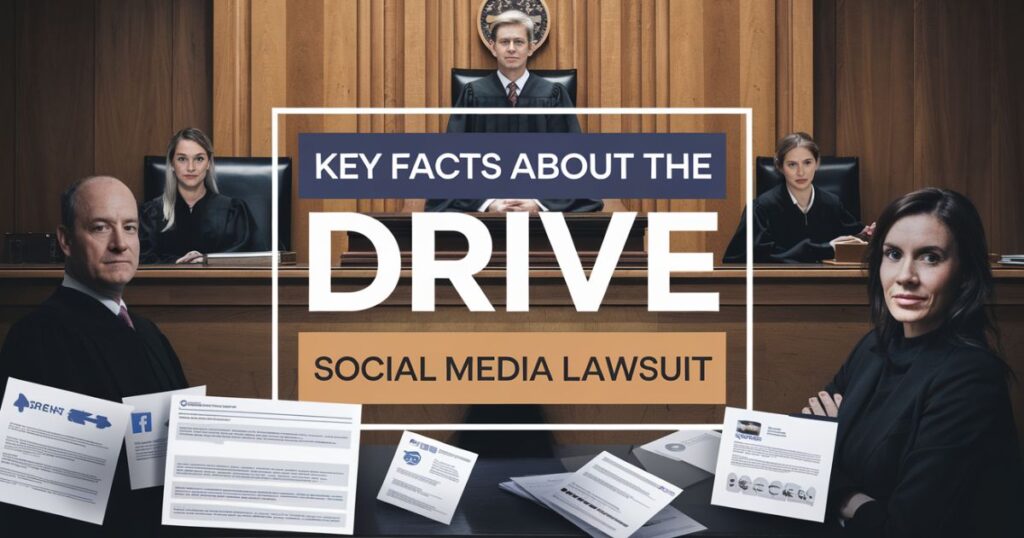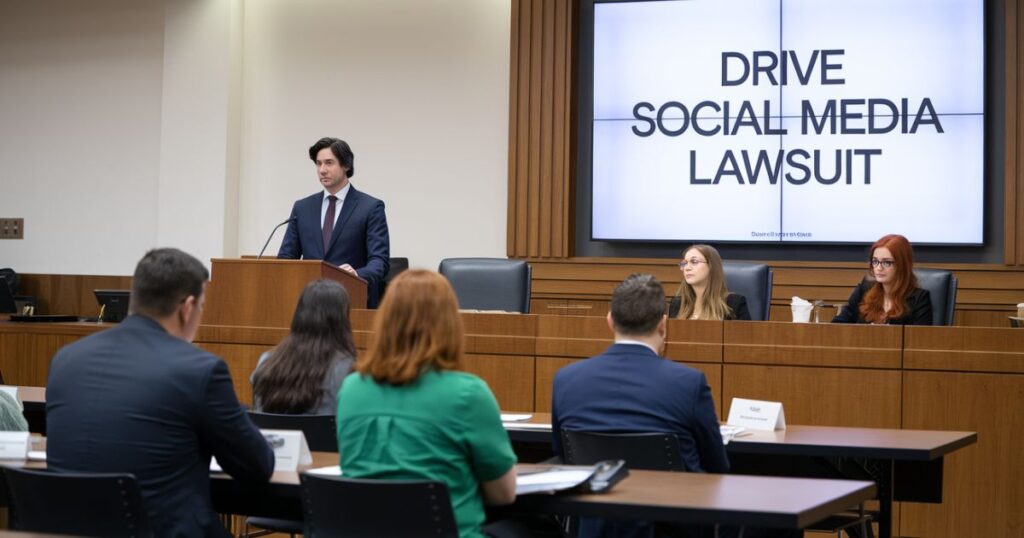The Drive Social Media Lawsuit is a legal battle shaking up the digital marketing world. It involves allegations against Drive Social Media, a marketing agency, for misleading practices and unfulfilled promises. This case highlights the growing tensions between client expectations and the realities of social media marketing.
Imagine waking up to find your business’s online reputation in shambles. That’s the nightmare many companies faced, sparking this landmark lawsuit. It’s not just about one agency’s missteps, it’s a wake-up call for the entire industry. Are you sure your social media strategy is on solid legal ground?
At its core, this lawsuit questions the ethics of social media marketing practices. It’s forcing businesses to reevaluate their partnerships and strategies. The outcome could reshape how companies approach online promotion, setting new standards for transparency and accountability in the digital age.
Why the Drive Social Media Lawsuit Matters
The Drive Social Media lawsuit isn’t just another courtroom drama it’s a game-changer for the entire digital marketing industry. This case is shining a spotlight on practices that many have taken for granted, forcing us to rethink how we approach social media campaigns. It’s not just about one company’s missteps; it’s about setting new standards for transparency and accountability in the digital age.
For businesses across the USA, this lawsuit is a wake-up call. It’s pushing us to examine our own social media practices and ask tough questions about legal compliance. The outcome of this case could rewrite the rulebook for how companies interact with their audiences online. So, whether you’re a small startup or a corporate giant, the ripples from this legal battle will likely reach your shores.
Key Facts About the Drive Social Media Lawsuit

At the heart of the Drive Social Media lawsuit is a clash between promises made and services delivered. The plaintiffs allege that Drive Social Media, a prominent digital marketing agency, failed to live up to its contractual obligations. They claim the company overpromised on results, used questionable tactics to boost engagement, and wasn’t transparent about its methods.
On the flip side, Drive Social Media argues that their practices were in line with industry standards and that client expectations were unrealistic. They maintain that social media success is never guaranteed and that they acted in good faith. As the case unfolds, it’s shedding light on the often murky world of social media metrics and the challenge of quantifying online success.
| Plaintiff Claims | Drive Social Media’s Defense |
| Overpromised results | Acted within industry norms |
| Used questionable tactics | Clients had unrealistic expectations |
| Lack of transparency | Success in social media isn’t guaranteed |
Legal Background of the Drive Social Media Lawsuit
To truly grasp the significance of this case, we need to understand its legal background. The Drive Social Media lawsuit isn’t happening in a vacuum it’s built on a foundation of existing laws and regulations that govern digital marketing in the USA. These include the Federal Trade Commission Act, which prohibits deceptive advertising, and various state consumer protection laws.
What makes this case particularly interesting is how it’s applying these laws to the relatively new frontier of social media marketing. Previous cases have dealt with false advertising in traditional media, but the Drive Social Media lawsuit is pushing into uncharted territory.
It’s forcing the courts to grapple with questions like: What constitutes a guaranteed result in the volatile world of social media? How much transparency should agencies provide about their methods? The answers to these questions could set important legal precedents for years to come.
Drive Social Media Lawsuit: What You Need to Know
If you’re feeling overwhelmed by the legal jargon and industry speak, don’t worry. At its core, the Drive Social Media lawsuit boils down to a few key issues. First and foremost is the question of accountability. The plaintiffs argue that Drive Social Media should be held responsible for failing to deliver on its promises. They claim the company used misleading tactics to inflate engagement numbers and didn’t provide the level of service outlined in their contracts.
Drive Social Media, however, contends that social media success is inherently unpredictable and that they can’t be held accountable for factors outside their control. They argue that their methods were in line with common industry practices and that they never guaranteed specific results. As the case progresses, it’s shining a light on the often opaque world of social media marketing metrics and raising questions about what constitutes ethical practice in the digital age.
How the Drive Social Media Lawsuit Affects Businesses
You might be thinking, “I’m not involved with Drive Social Media, so this doesn’t affect me, right?” Think again. The ripple effects of this lawsuit are likely to be felt across the entire digital marketing landscape. For one, it’s prompting many businesses to take a closer look at their own social media strategies. Are you confident that your agency is using ethical practices? Do you fully understand the methods they’re employing to boost your online presence?
Moreover, this case could lead to stricter industry regulations and increased regulatory oversight. We might see new guidelines emerge for how social media marketing services should be advertised and delivered. This could mean more paperwork and compliance checks for businesses, but it could also lead to greater transparency and fairness in the industry. In the long run, these changes could benefit businesses by creating a more level playing field and helping to build trust with consumers.
Read More : Prodigy Promos lawsuit: Everything Revealed in Marketing Controversy
Common Myths and Facts About the Drive Social Media Lawsuit
As with any high-profile case, there’s a lot of misinformation swirling around the Drive Social Media lawsuit. One common myth is that this case only affects large corporations. In reality, businesses of all sizes could feel the impact, especially when it comes to how they approach social media marketing. Another misconception is that the lawsuit is solely about financial compensation. While money is certainly a factor, the case is really about establishing ethical standards for the industry.
Now, let’s look at some facts. It’s true that this is one of the largest lawsuits of its kind in the social media marketing world. It’s also a fact that the outcome of this case could set important legal precedents for how digital marketing services are contracted and delivered. Regardless of how the court rules, this lawsuit is already changing how many businesses approach their social media strategies, with a greater emphasis on transparency and realistic goal-setting.
Understanding the Claims in the Drive Social Media Lawsuit
Diving deeper into the claims, we find a complex web of allegations. The plaintiffs assert that Drive Social Media engaged in several questionable practices. These include using automated bots to artificially inflate engagement metrics, promising guaranteed follower growth without disclosing the methods used, and failing to deliver the personalized strategy and content creation services outlined in their contracts. They argue that these practices not only violated their agreements but also potentially harmed their brands’ reputations.
Drive Social Media’s defense hinges on the argument that their practices were standard in the industry and that they never guaranteed specific results. They contend that social media success is influenced by numerous factors outside their control, such as algorithm changes and shifting user behaviors. The company also argues that clients were aware of and approved the strategies used. This case is forcing the industry to confront tough questions about what constitutes acceptable practice in the fast-evolving world of social media marketing.
Drive Social Media Lawsuit: The Role of Legal Representation

In a case as complex as this, legal representation plays a crucial role. Both sides have assembled teams of top-tier lawyers specializing in digital marketing law and contract disputes. The plaintiffs’ attorneys are tasked with proving that Drive Social Media’s practices went beyond acceptable industry norms and violated their contractual obligations. They’ll need to navigate the technical aspects of social media marketing while making their case understandable to a potentially non-tech-savvy judge or jury.
On the other side, Drive Social Media’s legal team faces the challenge of defending the company’s practices in an industry where the lines between innovation and deception can sometimes blur. They’ll likely argue that the company operated within the bounds of industry norms and that any shortcomings in results were due to factors beyond their control. The strategies employed by these legal teams could set the tone for how similar cases are handled in the future, potentially shaping the legal landscape for digital marketing disputes.
Steps Involved in the Drive Social Media Lawsuit Process
Understanding the lawsuit process can help demystify what’s happening in the Drive Social Media case. It all starts with the filing of a complaint, where the plaintiffs lay out their grievances and demands. This is followed by the discovery phase, a crucial period where both sides gather evidence to support their cases. This might include combing through emails, contracts, and performance reports.
Next comes the pre-trial phase, where attorneys from both sides may file various motions and engage in settlement negotiations. If no settlement is reached, the case proceeds to trial. During the trial, each side presents its arguments and evidence before a judge or jury. Expert witnesses may be called to testify about industry standards and practices.
After all evidence is presented and closing arguments are made, the judge or jury will deliberate and reach a verdict. Depending on the outcome, there may be an appeals process. Throughout this journey, both sides will be strategizing, negotiating, and adapting their approaches based on new information and legal rulings.
Drive Social Media Lawsuit: Potential Outcomes and Consequences
The potential outcomes of this lawsuit could reshape the digital marketing landscape. If the court rules in favor of the plaintiffs, stricter guidelines for advertising and delivering social media marketing services might emerge. This could lead to more transparent contracts, clearer performance metrics, and possibly even standardized reporting practices across the industry.
It might also result in financial penalties for Drive Social Media and potential compensation for affected clients. On the other hand, if Drive Social Media prevails, it could reinforce the idea that social media marketing results are inherently unpredictable and that agencies cannot hold themselves accountable for factors outside their control.
This outcome might lead to more cautious promises from marketing agencies but could also potentially stifle innovation in the field. Regardless of the verdict, this case is likely to prompt many businesses to review their social media marketing contracts and partnerships more closely. It may also spur industry associations to develop more robust ethical standards and best practices to help prevent similar disputes in the future.
The Broader Implications for Digital Marketing
The lawsuit against Drive Social Media could lead to significant changes in digital marketing, highlighting the need for greater transparency, ethical practices, and accountability. It may prompt industry-wide reforms to protect businesses and consumers, fostering trust and integrity in marketing strategies and performance reporting.
Ethical Considerations
The lawsuit against Drive Social Media highlights the ethical challenges in digital marketing, such as data manipulation and false advertising. This case underscores the need for integrity, transparency, and accountability to ensure trust between agencies and clients in the competitive marketing industry.
Industry Reforms
The Drive Social Media lawsuit could prompt significant industry reforms, including clearer guidelines on performance reporting, stricter oversight of digital marketing practices, and stronger enforcement of consumer protection laws, aiming to ensure transparency, accountability, and ethical conduct in marketing strategies to protect businesses and consumers.
Future Implications of the Drive Social Media Lawsuit for the Industry
The ripple effects of this lawsuit will likely be felt for years to come. One of the most significant future implications could be a shift towards greater transparency in social media marketing. We might see agencies providing more detailed breakdowns of their strategies and metrics. This will help clients better understand what they’re paying for.
This increased openness could foster stronger, more trusting relationships between businesses and their marketing partners. Another potential outcome is the development of more standardized practices across the industry. This could include clearer definitions of what constitutes engagement, more realistic goal-setting processes, and standardized reporting formats.
While this might seem restrictive at first, it could ultimately benefit both agencies and clients. By setting clear expectations and reducing the likelihood of disputes, it can provide valuable clarity. As the industry evolves in response to this lawsuit, businesses will need to stay informed and adaptable, ready to align their social media strategies with new best practices and regulations.
Conclusion
The Drive Social Media lawsuit is more than just a legal battle it’s a turning point for the digital marketing industry. As we’ve explored, its impacts stretch far beyond the courtroom, touching businesses of all sizes across the USA.From reshaping social media practices to setting new standards for legal compliance, this case is forcing us all to rethink. It’s challenging us to reconsider how we approach online marketing.
As the dust settles, one thing is clear: the landscape of social media marketing is changing. Whether you’re a business owner, a marketing professional, or simply someone interested in the digital world, staying informed about this case. And its outcomes is crucial. Understanding the issues at play and the potential consequences will better equip you to navigate the evolving terrain of digital.marketing.
FAQs: Drive Social Media Lawsuit
What exactly is Drive Social Media accused of?
People accuse Drive Social Media of overpromising results, using questionable tactics to boost engagement, and lacking transparency about their methods. The plaintiffs allege that the company failed to deliver on contractual obligations and potentially harmed their brands’ reputations.
How might this lawsuit affect my business if I’m not a client of Drive Social Media?
This lawsuit could change how companies across the industry approach social media marketing, even if you aren’t directly involved. You might see new regulations, more stringent contract terms, and a greater emphasis on transparency from marketing agencies.
Could this lawsuit lead to new regulations for social media marketing?
Yes, it’s possible. Depending on the outcome, we might see new guidelines or regulations aimed at ensuring more transparent and ethical practices in social media marketing.
What should I look for in a social media agency to avoid similar issues?
Look for agencies that are transparent about their methods, provide clear and realistic goals, and offer detailed reporting. Be wary of any promises of “guaranteed” results in social media marketing.
How long is the Drive Social Media lawsuit expected to last?
Legal proceedings can be unpredictable, but complex cases like this often take several months to years to resolve, especially if there are appeals. It’s best to stay tuned for updates as the case progresses.

I am a blog writer with 3 years of experience, focusing on general topics around the world. Check out my personal blog at [magzinemini.com]. for more insights.
